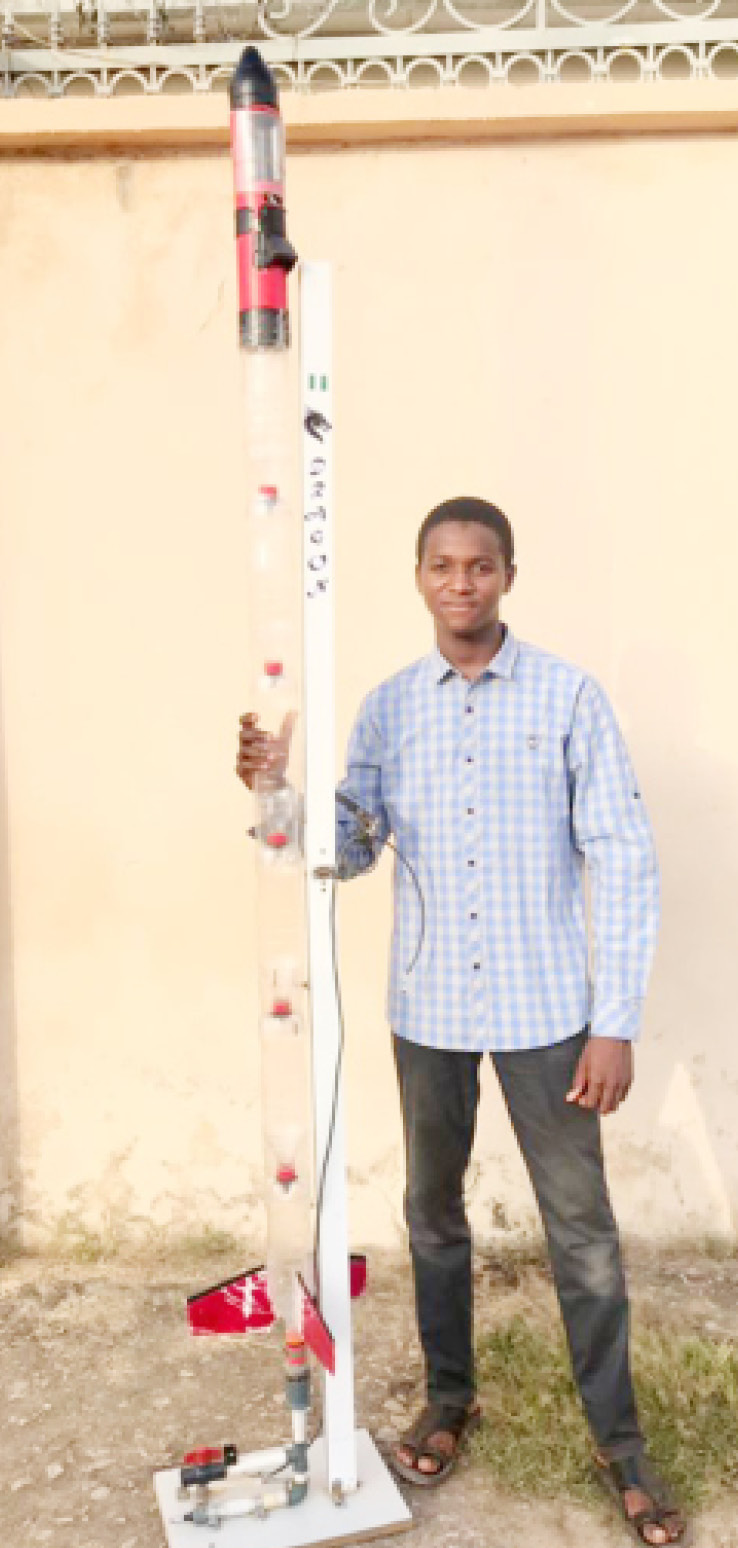Meet 18-year-old water-powered rocket inventor
A computer engineering student of the Bayero University Kano (BUK) has fabricated and launched a water-powered rocket with a capacity of going up 300 to 1000 meters above sea level at a speed of 250 kilometres per hour. Bilal Mustapha, a 100-level student, told Daily Trust that the rocket could be remotely controlled through GPS […]

Bilal poses with his water powered rocket
A computer engineering student of the Bayero University Kano (BUK) has fabricated and launched a water-powered rocket with a capacity of going up 300 to 1000 meters above sea level at a speed of 250 kilometres per hour.
Bilal Mustapha, a 100-level student, told Daily Trust that the rocket could be remotely controlled through GPS technology by either using a smartphone or a laptop computer and it could generate information as it had a digital camera connected to a memory card, adding that it also has a parachute attached to it to enable safe landing with a view to retrieving information recorded by the camera and stored in the memory card.
- Rains, pains: Inside Nigeria’s recurring flood menace
- Travellers’ nightmare continues on Lagos-Ibadan expressway
He said that the rocket, which is made up of plastic bottles and other materials sourced locally, was intentionally fabricated for remote sensing and could be used for surveillance purposes as well as data capture in difficult areas that cannot be accessed easily using a conventional approach.
Mustapha told our correspondent that he started constructing the water-powered rocket five years ago, in 2017, hoping to make anything that could fly but could not afford to make a remote-controlled aeroplane. For that reason, he started to look for something cheaper to make and that was when the idea of constructing the rocket was birthed.
“I love everything that can fly and therefore, I did a lot of research on YouTube. I saw people making things that were similar to what I intended to do and from there I was motivated. I continued to do more and more research. However, my biggest inspiration was Elan Musk – the founder and chief executive officer at SpaceX. I have read a lot about him. I follow updates from his company. I also follow him online on Twitter and Instagram.

“I started with a very small model and I kept improving on it until I made a bigger one with advanced technology. The first one I fabricated was very small, it could only fly about 15 meters but the last one can go as long as 300 meters. I launched it via both my smartphone and my laptop,” he said.
The 18-year-old Mustapha encountered a number of challenges before making a successful launch of the water-powered rocket. He said at the beginning, he did not know what would work and what would not until after a test. Secondly, he experienced multiple failures but kept trying until he got a reliable launching system.
Mustapha did not use a huge amount of money to buy the materials needed for the project. He said he bought them one at a time until he gathered everything. He saved to buy some of the materials, sometimes from his pocket money, while he was still in secondary school and if there was a need to buy something special, his father provided the money.
Mustapha, who finished from Yandutse College Kano before proceeding to the BUK, has also fabricated a car to be operated remotely by using a smartphone. He said the car, which has most features of the Mercedes E350, could move up to 20 meters distance via Bluetooth control, one kilometre by using a long-range antenna, and it could be controlled from anywhere and cover long distances via the Internet of Things (IoT) technology.
Mustapha is optimistic that with support and a conducive learning atmosphere, he would translate the innovation into conventional cars with advanced features like opening bonnets and operating the lighting system automatically.
The BUK Vice Chancellor, Professor Sagir Adamu Abbas, has promised to honour Mustapha for his breakthrough in research and creativity.
The vice chancellor, according to the university Bulletin, said it was a thing of joy and pride that a student of the university, at a very young age, could invent such technology which if improved would have a positive impact on society.
Bilal’s father, Mustapha Abdulkarim, thanked Almighty Allah for his blessings, saying Bilal had been a very promising child. “Right from secondary school, he has been interested in making things work.”
“He watches a lot of videos on information technology, engineering, sciences and so on. He doesn’t waste his time; he is very dedicated and doesn’t give up. He used his pocket money to buy a lot of apparatus. At times, I got worried and ask him why he spends money he’s supposed to use to feed in school to buy all these equipment.
“He has built a lot of minor things in the house. In fact, he carries out all minor electrical repairs and that was how he started. I was with him at the field when he made the successful launch of the water-powered rocket. We try to give him all necessary support in achieving his aim,” he said.
Abdulkarim said the launch was an eye opener, and only Allah knows what he had planned for him, adding, “I am only praying to Allah to guide him to something that will be useful to him, to the country and to humanity in general.”
Mustapha’s hope during his stay at the university is to see more things that would encourage innovation in academia like annual innovation competitions within the university and between universities to make students competitive and to challenge them with problems for solutions.
But his ultimate ambition after graduation “is to make a bigger rocket that can go to space, come back and land successfully just like how Elan Musk did his own,” he said.
Gambo S. Nababa
